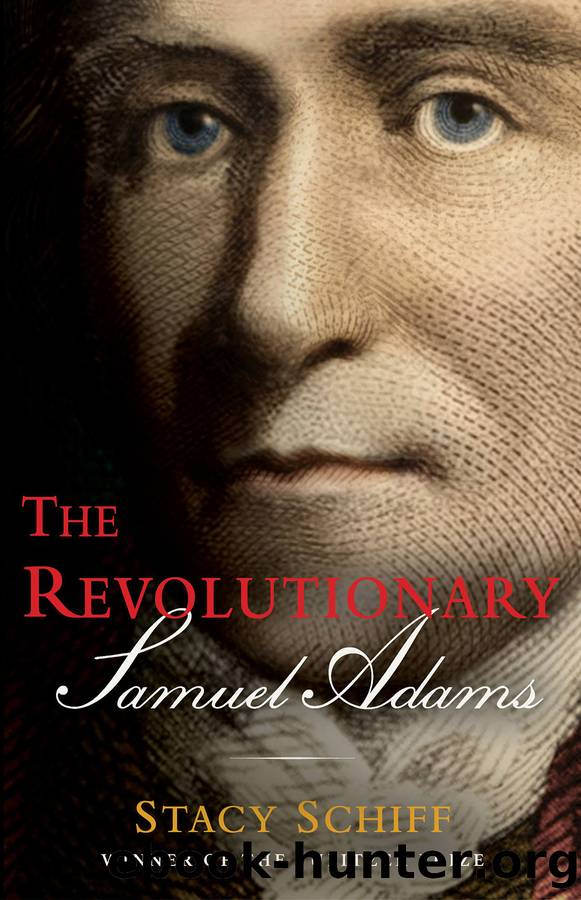The Revolutionary: Samuel Adams by Stacy Schiff

Author:Stacy Schiff [SCHIFF, STACY]
Language: eng
Format: epub
Publisher: Little, Brown and Company
Published: 2022-11-15T00:00:00+00:00
EARLY IN THE winter, amid much secrecy, a bundle of letters from London arrived on Thomas Cushingâs doorstep. They carried strict instructions. No copies were to be made, in whole or part. Under no circumstances were the letters to be published. They were to be shared only with several prominent men, then returned. Adams would have read them by March. He had dreamed of this very prize for years. Unhappily, he respected the embargo. âIt is a pity when the most important intelligence is communicated with such restrictions, as that it serves rather to gratify the curiosity of a few than to promote the public good,â he griped. Secrecy agreed with him. Wasted opportunities did not. Among the lettersâââpurloined from a London desk and entrusted to Franklin, who dispatched themâââwere six of Hutchinsonâs from the late 1760s. If their contents could be disclosed, Adams believed, Massachusetts would be rid of its governor forever. Franklin claimed that had essentially been his intention: the letters would exonerate the king and Parliament, transferring blame for Americaâs ordeals to those venal middle managers who had bartered away the countryâs liberties. Once the true villains were revealed, a bright, new chapter in Anglo-American relations would dawn. Adams needed no convincing. To his mind, Hutchinson had introduced all their present difficulties. America, and Great Britain, ought never to forgive him. Adams knew he never would.
While the documents could not be published, there was no ban on talking about them, leaving Adams free to proceed by innuendo and insinuation. Boston was soon aflutter. By May, whispers flew about that proof was on hand âof a conspiracy which had long been carrying on, for enslaving America.â There was talk miles away that Hutchinson had urged the arrests of Otis and Adams, to be deported or decapitated. The documents, promised the newspapers, would âbring many dark things to light, gain many proselytes to the cause of freedom, make tyrannical rulers tremble.â
Having advertised the letters, Adams proceeded, after the spring election, like a seasoned showman. He announced to the House that he would soon share a momentous discovery. It would return the province to the happy state it had enjoyed in 1760. His news created a sensation, the suspense building hourly. Finally on the morning of June 2 he revealed to a full House that he had in hand a set of explosive letters, deeply prejudicial to Massachusetts. They were to be shared only under certain conditions. If his colleagues agreed, he might read them aloud. The gallery was cleared and the doors clapped shut, the representatives sworn to secrecy. Adams then proceeded to read Hutchinsonâs words.
We do not know with what expression he intoned the 1769 line âThere must be an abridgement of what are called English liberties,â but we know of the reaction. The House lost no time in voting that the letters subverted the constitution. They seemed to point to a settled plot; Adamsâs name appears atop the eighty-two yeas demanding Hutchinsonâs and Oliverâs recall. By the
Download
This site does not store any files on its server. We only index and link to content provided by other sites. Please contact the content providers to delete copyright contents if any and email us, we'll remove relevant links or contents immediately.
Kathy Andrews Collection by Kathy Andrews(10507)
The remains of the day by Kazuo Ishiguro(7542)
Spare by Prince Harry The Duke of Sussex(4188)
Paper Towns by Green John(4163)
The Body: A Guide for Occupants by Bill Bryson(3789)
Be in a Treehouse by Pete Nelson(3206)
Harry Potter and the Goblet Of Fire by J.K. Rowling(3025)
Goodbye Paradise(2949)
Never by Ken Follett(2873)
Into Thin Air by Jon Krakauer(2695)
The Remains of the Day by Kazuo Ishiguro(2614)
The Genius of Japanese Carpentry by Azby Brown(2602)
The Cellar by Natasha Preston(2592)
Drawing Shortcuts: Developing Quick Drawing Skills Using Today's Technology by Leggitt Jim(2528)
120 Days of Sodom by Marquis de Sade(2428)
Architecture 101 by Nicole Bridge(2348)
The Man Who Died Twice by Richard Osman(2290)
Machine Learning at Scale with H2O by Gregory Keys | David Whiting(2267)
Fairy Tale by Stephen King(2058)
